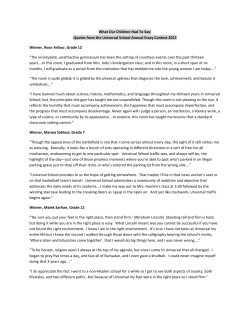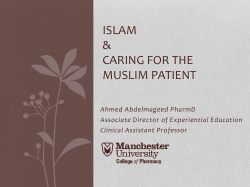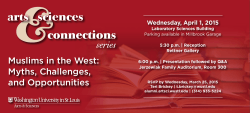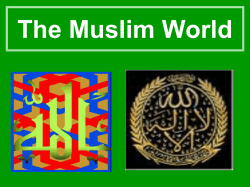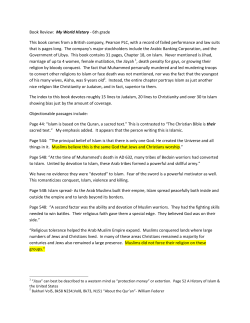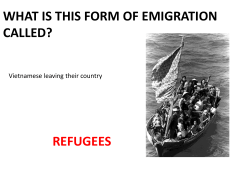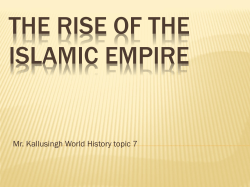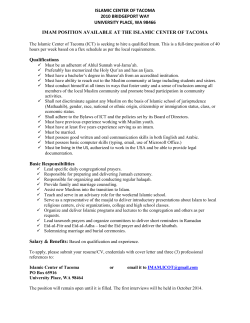
ANT 3930 Section 18EF Fall 2014
Course Title: Islam Culture/Society ANT 3930 Section 18EF Fall 2014 Days: M W F Period: 8 (3:00 pm – 3:50 pm) Classroom: MAT 0015 Instructor: Khadidja Arfi Office: to be announced Email:karfi@ufl.edu Office Hours: M W F (1:00 – 2:30 and by appointment Course Overview and Objectives The course is an introduction to the fundamental concepts of Islam and the role the religious ideas and institutions play in Muslim communities. This course uses a combination of some classical and theoretical texts together with a rich variety of ethnographic accounts of Muslim societies produced by anthropologists. This course aims to a better understanding of the Islamic religious tradition. It offers an insight into various forms of Islam as practiced in different geographic, social, and cultural contexts. Topics explored include daily salat (prayer) performance, Ramadan (fasting), Hajj (pilgrimage), Id al-adha (the feast of sacrifice), zakat (almsgiving), and the representation of Islam. The use of an anthropological perspective directs our attention to the multiplicity of perspectives involved in the study of local forms of Islam. We also recognize the transformation of knowledge and power relation of Muslim communities with the establishment of print media and the introduction of new media including the use of television, broadcast media, cassette recordings, and the internet. Thus, with the transformation in the perception and religious obligations and practices, in a globalized word, distinctive “Muslim” consumer cultures emerge within Muslim communities, especially in relation to Halal food consumption and Islamic fashion industry. Students Learning Outcomes Get a direction toward more research in the emerging academic field of the anthropology of Islam Appreciate the importance of fieldwork and comparison of theory and methodology Further their understanding of Muslims in a critical and reflexive manner Appreciate the presented glimpses of Islamic diversity through different anthropological accounts Discover that studying existing discourses and practices can contribute to a refined understanding of Muslims, their religion, and their practice. Explore the ways Muslims adjust their practices to the challenges of modern life and support and question each other by accounting to the diversity of traditions practiced by Muslims Become informed about variation even in common forms of Islamic practices and the tenets of Islam Textbooks and Required Readings The textbooks for the course are as follows: Islam observed by Clifford Geertz (1968). 1 Recognizing Islam: Religion and Society in the Modern Middle East by Michael Gilsenan (2000). Anthropology of Islam by Gabriele Mirranci, (2008). (One Chapter only) available through course reserve The Halal Frontier: Muslim Consumers in a Globalized Market by Johan Fishcher, (2011) Visibly Muslim: fashion, politics, faith, by Emma Tarlo, (2010). On reserve readings, videos, DVDs may be obtained through course reserve at Library West Chapters, articles and syllabus may be obtained through Sakai Other resources: video clips to be chosen as needed Exams, Writing Assignments and Grading Exams: Three take-home exams to be taken on the specific dates bellow [10% x2 = 30%] Papers/Writing: the writing assignments are of three forms: 1. Weekly short reflections, comments or questions on the assigned readings sent via discussion board on Sakai prior to class meeting [15%] 2. One page report on the “in the field” sent via Assignment on Sakai [5%] [In the field] assignment is for each student to be a participant observer of one or both of the communal Muslim rituals: Friday congressional prayer or one of the daily prayers at the local mosque of Gainesville on University Street (ICG) Eid al-adha (the feast of the sacrifice) communal gathering (time and place to be announced) 3. Final paper (6-10 pages) based on the ethnography of a specific Muslim practice sent via Sakai (20%) Oral presentation: of the ethnography of a specific Muslim practice (15%) Participation: students come to class ready to discuss the assigned resources (5%). Attendance: Attendance is required. Excused absences need to be documented 10% Policies on make-up work: No late assignments and make-up exams except with instructor’s permission. Final Grades. A detailed breakdown of final grades is as follows: A=93+, A-=90-92.9, B+=87-89.9, B=83-86.9, B-=79-82.9, C+=75-78.9, C=72-74.5, C-=69-71.9, D=62-68.9, E=<62 One can also link to the following: https://catalog.ufl.edu/ugrad/current/regulations/info/grades.aspx Course Policies and Procedures Classes, Readings, & Attendance Policy: Students are responsible to get their books prior to the beginning of class Students are responsible to follow the syllabus on Sakai Students are responsible to read the assigned text prior to class period Students are responsible to post “Discussion Forum” on Sakai their comments/questions/critics prior to class period 2 Students are required to attend class unless excused for out of the ordinary circumstances [attendance is taken on each class meeting] Classroom Behavior Rules: total courtesy for classmates and instructor is required. Communication: Students are in a course in which we communicate with each other through academic learning, thus, students should communicate with classmates and instructor with total respect and courtesy when discussing the course subjects. Academic Honesty: Students must conform to the University of Florida’s academic honesty policy regarding plagiarism and other forms of cheating. The university specifically prohibits cheating, plagiarism, misrepresentation, bribery, conspiracy, and fabrication. Violations will lead to the Department’s and the University’s procedures for dealing with academic dishonesty. All students are expected to honor their commitment to the University’s Honor Code and the student conduct code. Accommodation for Students with Disabilities Students requesting classroom accommodation must first register with the Dean of Students Office. The Dean of Students Office will provide documentation to the student who must then provide this documentation to the Instructor when requesting accommodation. Please make any requests by the second week of class. UF Counseling Services Resources are available on-campus for students having personal problems or lacking clear career and academic goals that interfere with their academic performance. These resources include: 1. 2. 3. 4. University Counseling and Wellness Center, 3190 Radio Road, 392-1575, personal and career counseling Sexual Assault Recovery Services (SARS), Student Health Care Center, 392-1161, sexual counseling Career Resource Center, Reitz Union, 392-1601, career development assistance and counseling Reading & Writing Center, Broward Hall, 392-0791, writing assistance, study skills, test preparation Course Outline Critical Dates: Final paper topic proposal: Due Week 13 [Assignments / Sakai] Take home exam I: Week 9: 10/23 – 10/26 due no later than Sunday 12:00 pm [Assignments / Sakai] Take home exam II: Week 11: 10/06 – 11/09 due no later than Sunday 12:00 pm [Assignments / Sakai] Take home exam III: Week 15: 12/04 – 12/07 due no later than Sunday 12:00 pm [Assignments / Sakai] Oral presentation: From 12/03 – 12/08 (select a date) Final papers due: December 19, 2014 or earlier [Assignments / Sakai] 3 Course Schedule: Week # Week 1 Week 2 Day M 08/25/14 THEME OF THE WEEK Introduction to Islam Culture/Society W 08/27/14 Islam: Faith and History F 08/29/14 Chap. 1 and 2 M 09/01/14 W 09/03/14 F 09/05/14 M 09/08/14 Chap. 3 Chap. 4 Chap. 1 and 2 READINGS DVD 4608 In class viewing and discussion Observing Islam by Clifford Geertz Recognizing Islam by Michael Gilsenan Chap. 3 and 4 W 09/10/14 Week 3 F 09/12/14 Chap. 5 and 6 Chap. 7,8,9,10, & 11 M 09/15/14 Conceptualizing / approaching Islam Beyond Ideology by Abdul-Hamid elZein The Idea of an Anthropology of Islam by Talal Assad W 09/17/14 chapter 2: Islam: Beliefs, History, and Rituals; in the Anthropology of Islam by Gabriele Mirranci (13-30) Week 4 F 09/19/14 Religious practices introduction M 09/22/14 1) Salat: performing daily prayer Rehearsed spontaneity and the conventionality of ritual: Disciplines of Salat by Saba Mahmood between belief and unbelief lies the performance of Salat: meaning and efficacy of a Muslim ritual by Kheiro Henkel +short movie on how Muslims perform daily prayers W 09/24/14 Week 5 F 09/26/14 M 09/29/14 CLASS OUTSIDE ACTIVITY Visit the local mosque 2) Siaym: Fasting during the month of Ramadan the observance of Ramadan in Swahili-Land by P.J. Frankl Being good in Ramadan by samuli Schielke W 10/01/14 Eid al-adha (The Sacrifice Holiday) Week 6 NO CLASS / IN THE FIELD: F 10/03/14 4 M 10/06/14 Participant observance of Gainesville Muslim community celebration for Eid al-adha (Place to be announced) The social significance of the hajj for Thai Muslims by Raymond Scupin The strength in the song by Barbara M. Cooper 3) Hajj: Pilgrimage to Mecca W 10/08/14 Movie on hajj Week 7 In class viewing and discussion F 10/10/14 On scriptural essentialism and ritual variation: Muslim Sacrifice in Sumatra and Morocco by John R Bowen Sealing the Quran: Offering and sacrifice among Pakistani Labour Migrants by Pnina Wer M 10/13/14 W 10/15/14 Week 8 4) Ud-hiya/Qurbani: Feast of Sacrifice F 10/17/14 Reorganizing social welfare among Muslims: Islamic voluntarism and other forms of communal support in Northern Ghana by Holger Weiss Financial worship: the quranic injunction to almsgiving by Jonathan Benthall Due Sunday at 12:00 pm M 10/20/14 5) Zakat: almsgiving W 10/22/14 Take-home exam I Week 9 F 10/24/14 Homecoming No class The Halal Frontier: Muslim Consumers in a Globalized Market by Johan Fishcher Chapter 1 & 2 (pp. 1-68) The Halal life style M 10/27/14 Continue…. The Halal life style Chapter 3 & 4 (pp. 69-107) Continue…. The Halal life style Chapter 5 & 6 (pp. 108-157) Conclusion (pp. 160-166) The economy of slaughter house Visibly Muslim: fashion, politics, faith, by Emma Tarlo, (2010). Introduction Biographies in dress Geographies of Hijab Navigation of style W 10/29/14 Week 10 F 10/31/14 Identity faith and dress Week 11 M 10/03/14 5 Continue… Identity faith and dress Diversity contested Covering concerns Hijab on line Islamic fashion scape W 10/05/14 Video on Turkey Islamic production Visualizing Identity of faith and dress Take-home exam II F 10/07/14 Methodological reflections on the anthropology of Islam 1. situating anthropology Due Sunday 12:00 PM through Sakai Toward Islamic anthropology: definition, dogma and directions by Akbar S. Ahmed M 11/10/14 Week 12 Week 13 W 11/12/14 Continue… situating anthropology F 11/14/14 2. Representing Islam M 11/17/14 Chap. 1 W 11/19/14 Chap. 2 F 11/21/14 Chap. 3 M 11/24/14 Chap. 4 & Epilogue Islamic anthropology and anthropology of Islam by Richard Tapper Covering Islam: how the media and the experts determine how we see the rest of the world by Edward Said Islam obscured the rhetoric of anthropological representation by Daniel Varisco W 11/26/14 Week 14 Week 15 Week 16 F 11/28/14 Thanksgiving Holiday M 12/01/14 Movie on Islam obscured/Muslims observed W 12/03/14 Oral presentation F 12/05/14 Oral presentation M 12/08/14 Oral presentation W 12/10/14 F 12/12/14 Last day of Class Take-home exam III Due Sunday at 12:00 pm Reading days Final Paper due December 19, 2014 or earlier, ELECTRONIC COPY, VIA Sakai 6
© Copyright 2025
